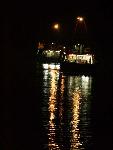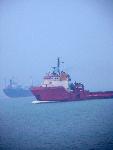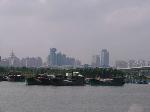- Getting around Lijiang. Dont stay in the Old Towns more than 2 days, there is nothing to do. KRISS Oct 9, 2013 05:46
- 2013 Beijing Temple Fair BENNYLAU Feb 26, 2013 03:29
- Malaysian traveling from KUL - LAX vis Shanghai PVG ZATI_DY Jan 3, 2013 20:15
Crossing the Gulf
- Views: 3824
- |Vote: 0 0
- |Add to Favorites
- |Recommend to Friends
Into the Black Sea
The sun had set over the collection of old boats in the southern harbour at Beihai, and the fishermen had already pulled in their nets and settled for the night in their warm cabins, throwing off their salty shirts and sitting bare-chested in circles lit by single naked bulbs, smoking, playing cards, their laughter shifting about in the still, tropical sea air. Billowing clouds in the tangerine sky at sunset had cast smoky amber shadows over the Tonkin Gulf that had faded into an oily black at the rising of the moon. At the crest of the gulf that flows into the South China Sea, the sounds of the hundredfold creaking vessels echoed around the harbour as the great, hulking iron gulf ferries sat heavily in the salt water, silently awaiting their nightly crossing to China's southernmost province, the island of Hainan.
I hauled my luggage over the thick metal ramp that had been slammed down onto the concrete wharf. The ramp led directly into the vehicle deck, a vast, dark iron hold saturated with the acrid stench of motor oil and sea salt and filled with cars bound for the island highways. A plate metal staircase led precariously to the upper decks, and lifting my heavy bags up in the evening heat quickly made my muscles sore and tired: I quickened my pace to the bunk rooms where I could slide my backpack under the thin board mattress and sit awhile. The room was quickly filling with passengers – in the larger cabins, predominantly men who quickly peeled off their sweaty T-shirts and socks and stretched themselves out on cane mats which they unrolled onto their bunks. A few lay back and lit cigarettes and prepared themselves for the eleven hour journey across the gulf: I watched them lazily for a while before deciding to get up and walk around the deck.
The ship was a Spartan frame of welded iron compartments that made for a sturdy boat – it had made this crossing into Hainan on many such nights and as I strolled the passenger decks I could see that the ship was marked from wear – walls were stained from joints rusted in seawater, and the smell of wet human bodies had long since worn into the paintwork. Thin corridors led through dorm rooms of varying prices and corresponding numbers of beds, almost all sweltering with the day's heat radiating out from the metal. Near the front of the boat, a row of slightly more comfortable rooms had fans and old TVs fastened onto the walls for the enjoyment of less hardy passengers . Even still, the sheer mass of the ship made inescapably deep creaking sounds that were almost physical – every slight movement of the boat could be felt right through the body, and as the crew began to bring the vessel to life for the trip across, the hum of oily engines and mechanical equipment began to shake the hull.
On deck at the stern, massive gears sprung into action as the ship's anchor was painfully hauled to the surface – bright bursts of noise from the ship's foghorns sounded into the night, and the great iron ferry began to inch away from the Chinese mainland, heading out into the pitch-black sea.
Journey to Hainan
It's hard to believe now, when images of palm-lined beaches with white sand inspire all to dream of tropical holidays in paradise, but Hainan has been considered the least hospitable place in the whole of China for hundreds of years. The slow procession that this old metal boat was making across the water is one that follows that of men who made the same journey in centuries past with heavy hearts – for a ticket to Hainan was one that spelt exile from all civilization for the hapless officials who had fallen from favour and been tossed out of court to be sent to this remote wasteland. As I stood at the rail watching the dark Chinese coast recede into the blackness, I wondered about those who had done so before me, spirits breaking as they took their last look back at the great empire. Hainan then was almost completely undeveloped: the home of uncivilized minority groups and unruly peasants living far from the influence of the Emperor, it was a place where any official was sure to endure hardship – the tropical equivalent of Siberia.
Times have changed, and as a visitor to the China with the priviledge to be able to travel at will, I was excited to be finally getting to see China's great tropical island. Now a highly developed region with a burgeoning population and a thriving tourism industry, remote beaches have become centres for international travelers who stay in towering luxurious hotels and spend thousands to come to lie on the sand and enjoy the sun. If only those officials of ancient times had appreciated the value of getting a good suntan, then perhaps that would have made their exiles in the sunshine far more enjoyable.
The seawater was pleasantly warm, and the boat pushed on through the night across its surface, the giant engine throbbing smokily in its belly. Passengers who'd booked a seat class ticket were sitting fanning themselves on the rear deck; others sat with their fellows playing poker and mahjong, as others still sat blankly watching a TV set up on a rear table, the screen flickering blue in the dark ocean night. Most were able to sleep in the warm night air; those on the hard bunks were all already fast asleep, lying without blankets, their chests exposed to the dim orange light of the dorm's weak lightbulbs. The skin of the men in my large bunkroom were well darkened by the sun and by work, their muscles marked with sweat and toil, and yet their peaceful expressions as they slept on the boat seemed to reflect the quiet and strength of the silent sea below.
I walked another circuit of the decks: in every direction the sea was dark, and I felt as if I too was alone in China's past, out far away from the heart of China, imagining once again that I could feel the solitude of an exile. It was all too strong – the smell, the weight of the metal balanced on the water, and the heat – I lay back on my bunk and slept dreamlessly.
Coming Into Haikou
Slowly, a dim grey light spilled onto the ocean water and the cloudy sky gradually brightened in the dawn. The gulf was busy with cargo liners drifting beneath the slow, shimmering sunrise with their burdens of heavy crates, but the sheer immensity of the sea kept neighbouring vessels at lonely distances from each other. I wandered out to the rail and watched as the grey sea tossed about in the murk: waiting for the dim shape of the Hainanese coast to become visible in the distance from the front of the boat.
Slowly the edge of the land came into view, and as the ferry approached the city of Haikou the solid forms of highrises and harbour boats became apparent against the sky. From the sea, Haikou seemed massive and sprawling – the capital of Hainan province that had once been an impoverished, ignored backwater now become a formidable metropolis of international proportions.
Our boat passed a few remote beaches lined with palm trees, and began to move into the Haidian River. The enormous bridge at the mouth of Haikou's new harbour, the New Century Bridge, spanned the river banks and our gigantic iron boat slipped quietly beneath it with an air of reverence. As we passed, the bridge hummed quietly with morning traffic as if in prayer.
Other ships and the buildings of the port passed by as if in slow motion. The waking harbour was a modest collection of port vessels gradually moving out to their day's work in the ocean, and young Chinese seamen leaned against the sides of their boats smiling cheerfully as they watched the great ferry come in to dock. There was a thud as the metal struck the siding, and the front motors worked again to drop anchor as ropes were thrown from the side to tie the ferry in place. The back ramp was lowered and the cars, their drivers already sitting revving their engines, released their brakes and rolled onto the wharf, driving off beneath the harbour gates into the morning traffic.
The passengers descended the ladders one by one and I waited until the way was clear to carry my luggage down – waving ineffectually at the exhaust fumes and stink of motor oil. I stepped onto firm land and looked around me – at last, I had arrived in tropical Haikou, the southern paradise, the Hawaii of China. Here on the northern coast, I was unlikely to see much of the stereotypical beachside scenery that Hainan lays claim to and that I'd seen in promotional pamphlets, but I hoped to stay here in the capital for a few days to sample what typical Chinese life was like on the Island. Perhaps here I would find a more joyful China, a China smiling under the rays of the south sea sunshine.






 Copyright © 1998-2026 All rights reserved.
Copyright © 1998-2026 All rights reserved.